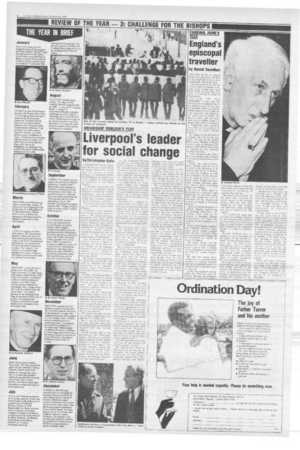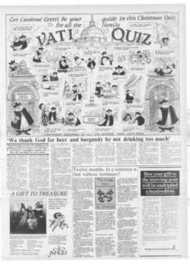Page 4, 25th December 1981
Page 4

Report an error
Noticed an error on this page?If you've noticed an error in this article please click here to report it.
Tags
Share
Related articles
The Day Adenauer Begged Me To Sign Up For Europe
When Fair Play Becomes A Way Of Life
Sheppard Going To Liverpool
Archbishop Worlock And Dr1 Sheppard Try To Reconcile Parties
A Man For All Reasons
Liverpool's leader for social change
by Christopher Rails
A JOURNALIST friend of mine from the North was once told by Sir Harold Wilson that it had been his decision, as Prime Minister. to recommend Bishop David Sheppard for appointment to the Anglican see of Liverpool in succession to Dr Stuart Blanche.
"I watched with interest the choice of Archbishop Derek Worlock to head the Catholic archdiocese." said Sir Harold, "and I felt the Church of England should have someone comparable who would get on with him."
If this story is true, it is a tribute to our erstwhile Labour Prime Minister.
Liverpool's social problems have hit the headlines again and again in 1981, and at every turn. Liverpool's two senior church leaders. ArchbishopAVorlock and Bishop Sheppard. have shown themselves in the forefront of commitment to socialchange. and have worked tireless!) together throughout the year on behalf of the poor and disadvantaged of Merseyside.
This co-operation on social matters became evident in February and March when the Iwo bishops met the managing director of Tate and Lyle. Lord Jellicoe, in an attempt to persuade him not to shut down the sugar refinery.
The bishops issued a statement in which they warned that "we could be witnessing the tragic dismantling of an important industrial base'. Unfortunate!). despite their efforts, the plant was closed.
On May I. the Peoples March for Jobs left Liverpool on its long trek to London, and Archbishop Worlock was the preacher at a send off service held at St Nicholas Anglican Church in Liverpool City Centre.
It was, said the archbishop. "our Christian duty to stand with those men and women who were adopting a legitimate and positive means of calling attention to a level of unemployment in many parts of the country which the nation as a whole should recognise as unacceptable".
The march for jobs. he said. was "almost a pilgrimage in the rightness of its objectives".
But it was the Toxteth riots. and their aftermath which gave Archbishop Worlock und Bishop Sheppard their most exacting challenge.
On the second night of the disturbances, the archbishop. together with his own auxiliary. Bishop Anthony Hitcher.. Bishop Sheppard and the Anglican Bishop of Warrington. Dr Michael Henshall. toured the Liverpool 8 area for four hours.
The following week Arch hishop Worlock met the Prime Minister. Mrs Margaret Thatcher when she visited Liverpool. In July. Archbishop Worlock accepted an invitation from the Chief Constable of Merseyside, Mr Kenneth Oxford. to chair discussions between the police and representatives of community groups in Toxteth. It was not absolute' \ clear what the archbishop's role would be.
He soon found out. Community leaders were generally suspicious of the police, and the archbishop found 'himself trying to keep the peace and a sense of balance in a situation which taxed to the full his abilities as a negotiator.
Members of a number of organisations boycotted the meeting and jeered at the archbishop for taking part. At the meeting itself, he heard much criticism of the police. including allegations of harassment. Nevertheless. the archbishop was able to ,report some positive suggestions for community policing.
The following week. Archbishop Worlock and Bishop Sheppard formally welcomed proposals for community policing. and the Environment Secretary, Mr Michael Heseltine's proposals for investment in Merseyside.
But the lull in the storm was short-lived. At the end of August the archbishop found himself under attack from critics of a £500 grant from the 'British Council of Churches to the Liverpool 8 Defence Committee. which had organised an antipolice march resulting in injuries 10 members of the police force.
A spokesman for Archbishop Worlock pointed out that the Church leaders had been adamant in their condemnation of all forms of violence.
"Because of their Christian commitment." said the spokesman. they set their focus on long-term social justice and so tried to penetrate the din and horror of violence and listen to the local community."
In September. the archbishop was one of a number of experts who addressed the Community Challenge Conference on the problems of Britain's inner cities. The conference was organised by The Guardian and the Gulbenkian foundation. and held in Liverpool.
Referring to himself as "a reluctant prophet" the archbishop warned his listeners they were dealing with "alienated or disadvantaged people who feel they have no part in their own destiny", It was "an emotive issue and an explosive one".
The only approach to the inner cities was "to and through and with the people% he said.
But criticism of his work for Merseyside was not yet over. In November, Mr James Jardine, Chairman of the Police Federation claimed that Archbishop Worlock and Bishop
Sheppard had given too much sympathy to the rioters and little if any, to their victims.
"I don't feel inclined to listen to leading churchmen who are rushing to sign cheques for the supporters of the mob but too busy blaming the police even to spare a few minutes to visit wounded policemen in hospital."
The archbishop reacted by pointing out that he and Bishop Sheppard had spoken on behalf of all the disadvantaged and had signed no cheques to anybody.
Something of the importance of Arehbishop Worlock's part in the aftermath of the Toxteth riots became evident in November when the Scarman report on the Brixton riots reported that Lord Scarman had met Archbishop Worlock and Bishop Sheppard. who emphasised the importance of involving communities, partiettlarly the black corro inuniot, in important decisions affecting their members' lives.
This month. the archbishop chaired a second meeting between the police and community organisations. with an apparently successful outcome. and Mr Oxford, Merseyside's Chief Constable, disassociated himself from the "misguided and uninformed comment" to which Archbishop Worlock had been exposed afcer the riots.
The last twelve months have quite. possibly been the most taxing Archbishop Worlock has had to face. but he has emerged no doubt deepened by the experience.and with the respect and gratitude of a great many Liverpool citizens.
blog comments powered by Disqus











